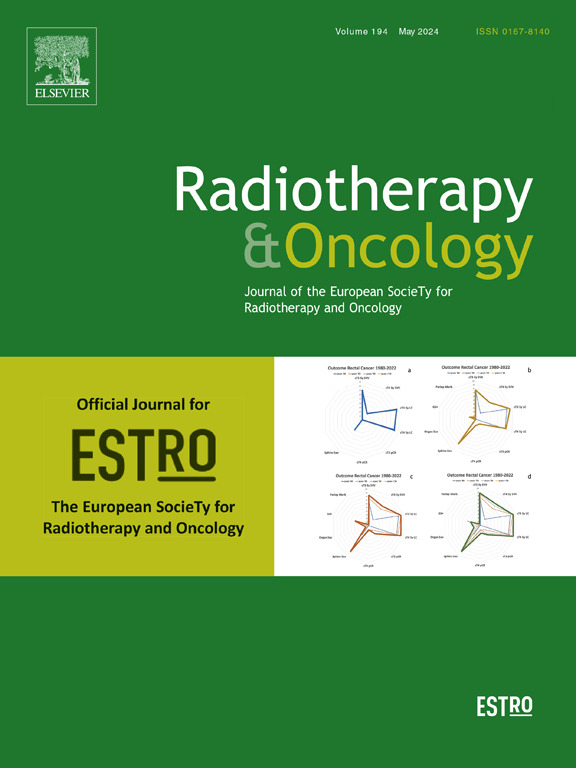Optimum radiation dose for palliation in head and neck squamous cell carcinoma (OpRAH) – A phase 3 randomized controlled trial
IF 4.9
1区 医学
Q1 ONCOLOGY
引用次数: 0
Abstract
Purpose
Radiotherapy is frequently employed for palliative treatment in locally advanced head and neck squamous cell carcinoma (HNSCC) but radiation dose fractionation regimens are not well-defined. We designed this phase 3 randomized controlled trial to compare two weekly hypo fractionated regimes and study the effect on progression-free survival (PFS) in this subset of patients.
Materials and Methods
Non-metastatic locally advanced HNSCC patients (n = 305) who were not suitable for curative treatment were randomized to Arm A (20 Gy/5#/5 days) and Arm B (30 Gy/5#/5 days). PFS and OS were recorded along with acute toxicity using patient-reported quality of life HN QLQ 43.
Results
From April 2020 to August 2023, 390 patients were randomized, of which 305 were eligible for final analysis. At a median follow-up of 13.9 months, PFS and median overall survival (OS) for the entire cohort was 7.4 and 10.03 months, respectively. PFS (p-0.553) and OS (p-0.203) did not differ significantly between the two groups. Toxicity rates were similar between the two arms and dose escalation was well tolerated. Patients with a better PS were found to have significantly better OS. No significant benefit in OS or PFS was observed in patients who received neoadjuvant chemotherapy (NACT), underwent definitive conversion, or received palliative chemotherapy at progression.
Conclusion
This is the largest phase 3 RCT to analyze the safety and efficacy of weekly palliative radiotherapy regimens and has not demonstrated further improvement with dose escalation.
头颈部鳞状细胞癌姑息治疗的最佳放射剂量(OpRAH)--三期随机对照试验。
目的:放疗经常被用于局部晚期头颈部鳞状细胞癌(HNSCC)的姑息治疗,但放射剂量分型方案尚未明确。我们设计了这项三期随机对照试验,比较两种每周低分次治疗方案,并研究其对这部分患者无进展生存期(PFS)的影响:不适合接受根治性治疗的非转移性局部晚期HNSCC患者(n = 305)被随机分配到A组(20 Gy/5#/5天)和B组(30 Gy/5#/5天)。使用患者报告的生活质量 HN QLQ 43 记录 PFS 和 OS 以及急性毒性:2020年4月至2023年8月,390名患者接受了随机治疗,其中305名符合最终分析条件。中位随访时间为13.9个月,整个队列的PFS和中位总生存期(OS)分别为7.4个月和10.03个月。两组患者的 PFS(p-0.553)和 OS(p-0.203)无显著差异。两组患者的毒性发生率相似,对剂量升级的耐受性良好。PS较好的患者的OS明显较好。在接受新辅助化疗(NACT)、明确转归或在进展期接受姑息化疗的患者中,未观察到OS或PFS方面的明显获益:这是分析每周姑息放疗方案的安全性和有效性的最大规模的三期临床试验,并没有显示出随着剂量的增加会有进一步的改善。
本文章由计算机程序翻译,如有差异,请以英文原文为准。
求助全文
约1分钟内获得全文
求助全文
来源期刊

Radiotherapy and Oncology
医学-核医学
CiteScore
10.30
自引率
10.50%
发文量
2445
审稿时长
45 days
期刊介绍:
Radiotherapy and Oncology publishes papers describing original research as well as review articles. It covers areas of interest relating to radiation oncology. This includes: clinical radiotherapy, combined modality treatment, translational studies, epidemiological outcomes, imaging, dosimetry, and radiation therapy planning, experimental work in radiobiology, chemobiology, hyperthermia and tumour biology, as well as data science in radiation oncology and physics aspects relevant to oncology.Papers on more general aspects of interest to the radiation oncologist including chemotherapy, surgery and immunology are also published.
 求助内容:
求助内容: 应助结果提醒方式:
应助结果提醒方式:


